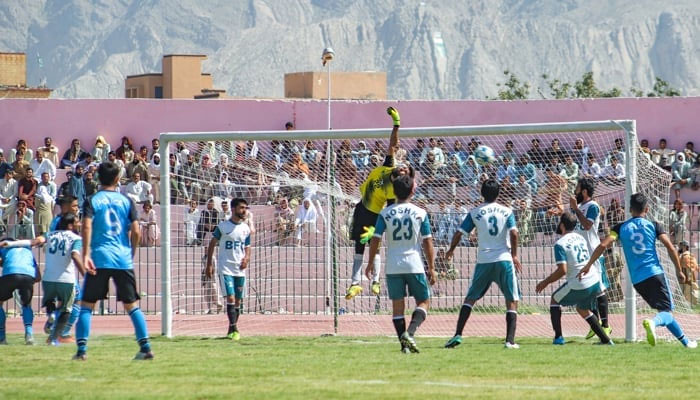
A match in progress during the CM Balochistan Gold Cup 2022 — Directorate General of Sports Balochistan
By Manish Rai 18 October 2023
Last month the Baloch Liberation Tigers (BLT) abducted six football players who BLT said were informants of ISI. In response, a large-scale military operation was launched in the Dera Bugti district of Balochistan. High-ranking officials, including Pakistan Army’s Twelfth Corps Commander Asif Ghafoor and IG Frontier Corps Balochistan, visited Dera Bugti to oversee the operation. This indicates that it was a large-scale operation involving extensive deployments of ground troops, air forces, and gunship helicopters. This operation saw numerous houses in Sui a subdivision of Dera Bugti subjected to search and seizure, with reports of homes set ablaze and residents coerced into migrating. Several areas in Dera Bugti remain under military lockdown, with a growing list of individuals who have disappeared under mysterious circumstances. The Pakistani establishment is making the same grave mistake that it has always done in Balochistan which is to use weapons rather than talks. It is essential to recognize that coercion and oppression will only exacerbate the already precarious situation in Balochistan. Historically, attempts to suppress the Baloch issue through force and tyranny have proven futile. The most evident example of this is the killing of 79-year-old Baloch veteran leader Nawab Akbar Khan Bugti in August 2006 in the Tartani area of Dera Bugti. After he died in the military operation a new wave of ferocious insurgency emerged. The current situation is no exception; it is likely to breed more problems rather than offering solutions.
I spoke with Mr. Sher Mohammad Bugti, the Central Spokesperson of the Balochistan Republican Party (BRP), in regard to this operation. BRP is a political separatist organization formed in Dera Bugti in 2008. Mr Bugti said that the Pakistani military has doubled its use of extreme force against the Baloch people. They have conducted countless operations, in which they have disappeared thousands of Baloch civilians, killed and dumped many others. He further added surprisingly enough, each time they have found themselves a way to be not only excused from being questioned but justified the crimes in one form or another. He also said that despite the lack of any official ‘State of Emergency’ in Balochistan, Pakistani Security forces are presently using force that is often excessive, indiscriminate, and in violation of Pakistan’s constitution and international pledges. On the pretext of countering militancy, killings, enforced disappearances, and mass arrests have become the order of the day in the province.
Balochistan is like a goldmine for Pakistan with its vast mineral and natural resources. The province contains plentiful supplies of oil, coal, gas, gold, silver, uranium, and copper. It provides Islamabad direct access to the strategically significant Indian Ocean, with a thousand kilometers of coastline near the entrance to the Strait of Hormuz from where the most important shipping lanes pass. Despite having such vast natural wealth, much of the population of the province lives below the poverty line. With limited or no access to education, jobs, electricity, roads, and clean water. Barely 41% of the population is literate (the national average is 57%), the unemployment rate is around 30% and just 7% have access to running water. And while Balochistan provides one-third of Pakistan’s natural gas supply only a handful of towns are hooked up to the supply grid. For example, gas reserves were discovered in Sui of Dera Bugti in 1952, but the locals still use wood as fuel for cooking. Other social indicators such as infant mortality rate and life expectancy are also low compared to the national average. As a common Baloch fails to understand why he is forced to live in abject poverty. While other provinces of Pakistan are benefitting from the natural resources of his homeland.
Launching military operations in the name of a crackdown on insurgency won’t make much of a difference in fact it might ignite another fierce phase. At the core of the ethno-nationalist armed insurgency is the deep-rooted feeling of oppression among the Baloch people. The Pakistani deep state has always labeled these insurgencies as the handiwork of foreign intelligence agencies. But the truth is that forceful occupation and looting of vast natural resources have fuelled the call of Baloch nationalism.
Pakistan’s political and military leadership has to understand that there can be no solution to the Baloch issue through military means. Balochistan requires a political solution. There is an immediate need to establish confidence and mutual trust among Balochs in order to resolve the issues of insecurity, injustice, and anger among them. Instead of false promises, the people of Balochistan need real action on the ground. So that they can feel themselves beneficiaries of progress and development in their own province. However, the government needs to handle the matters with utmost care, empathy, and amicably rather than resorting to the use of violence. Failure to do so in a fair and just manner would only alienate the Baloch people from the Pakistani state. As a result, more and more people will find armed struggle as the only option left for them. The global community has to understand that the Baloch struggle for independence differs significantly from other conflicts in the greater Middle East, which are defined by religious intolerance and sectarian divisions.
